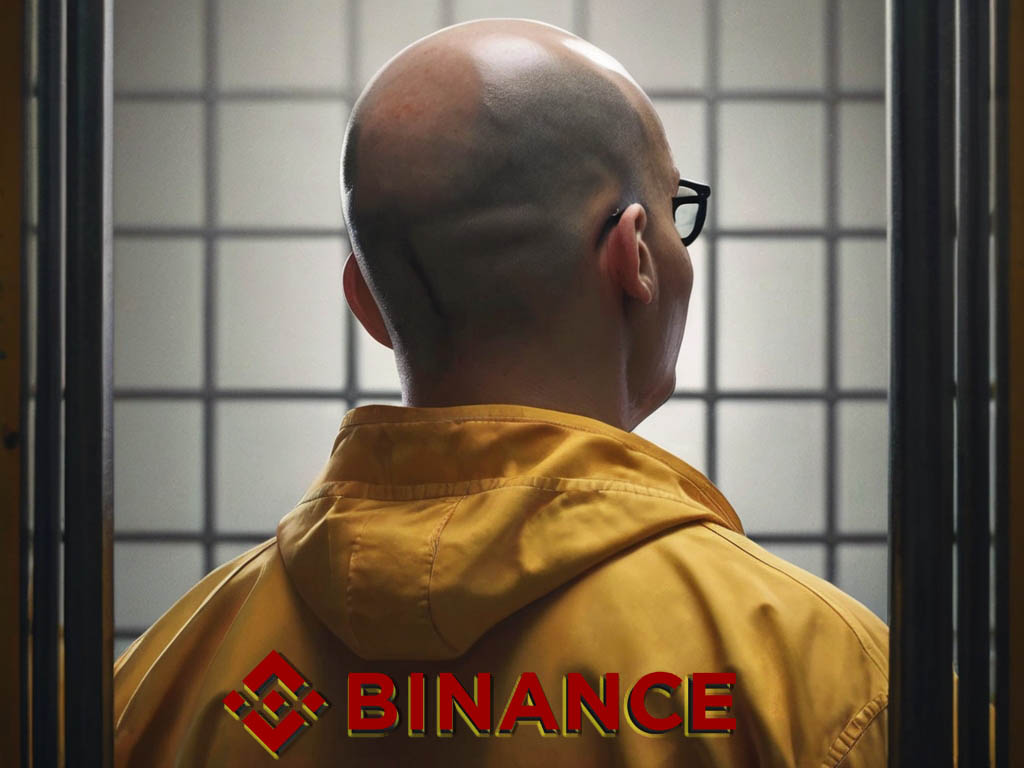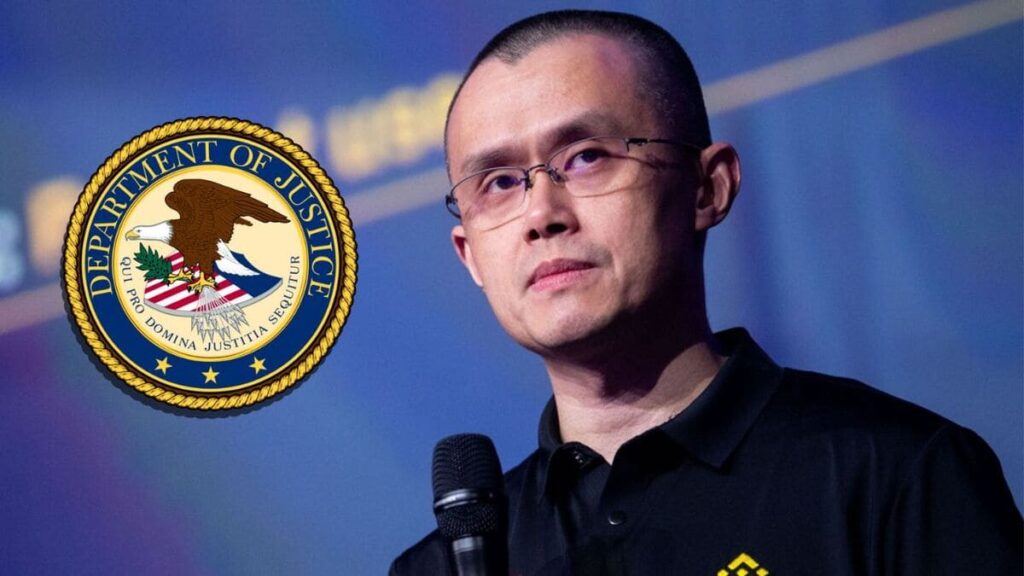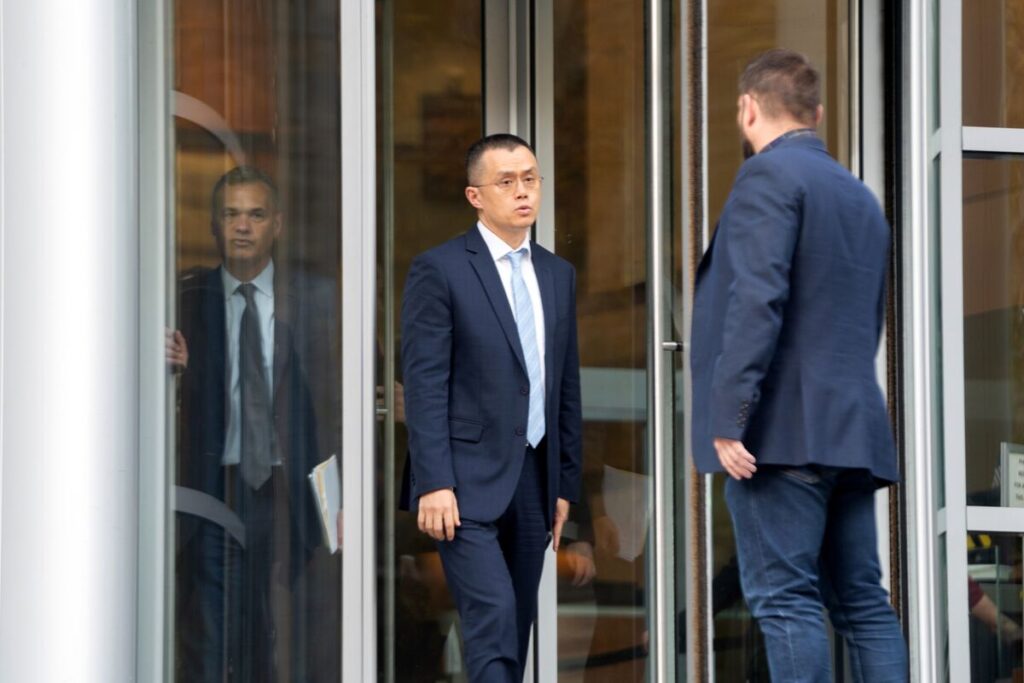Behind Bars: The Dramatic Sentencing of Changpeng Zhao

Changpeng Zhao, also known as CZ, is a famous figure in the cryptocurrency industry who founded and served as CEO of Binance, the world’s largest centralized cryptocurrency exchange. Under Zhao’s leadership, Binance grew rapidly after launching in 2017, processing trillions in trading volume across thousands of coins and tokens.
Zhao has a major background in software development and financial trading systems. Before dedicating himself to Binance, he worked at Bloomberg Tradebook developing futures trading software and founded Fusion Systems to build high-frequency trading systems for brokers.
As CEO of Binance, Zhao played its role in the exchange’s parabolic growth and expansion. He stepped down from the CEO role in November 2022 as part of a deal with the Department of Justice after being criminally charged with enabling illegal money laundering activities on the Binance platform.
Zhao, a Canadian citizen born in China, has been an influential and outspoken advocate for cryptocurrencies and blockchain technology. He built a net worth estimated in the billions from his Binance stake.
Now Zhao awaits sentencing in a Seattle court, facing potential prison time for his role in violations of U.S. anti-money laundering laws and sanctions. The outcome of the case could have significant impact for regulation and enforcement in the cryptocurrency sector.
Charges Against Zhao
In November 2022, Changpeng Zhao pleaded guilty to enabling money laundering during his tenure as CEO of cryptocurrency exchange Binance. Zhao was charged by the U.S. Department of Justice with failing to implement an effective anti-money laundering (AML) program at Binance.
Prosecutors allege that under Zhao’s leadership, Binance operated with a “Wild West” approach that knowingly failed to fulfill the exchange’s legal responsibilities. Binance is accused of processing transactions involving earnings from unlawful activity without proper controls in place.
The charges against Zhao represent a landmark case in holding crypto executives accountable for flouting AML regulations. His actions enabled criminals to launder money on an “unprecedented scale,” according to authorities.
By pleading guilty, Zhao admitted his role in neglecting Binance’s AML duties as CEO. His charges carry a maximum sentence of 5 years in prison.
Guilty Plea
In November, Changpeng Zhao pleaded guilty to enabling money laundering as part of a deal with the Department of Justice. As part of the plea agreement, Zhao agreed to step down from his position as CEO of Binance.
By pleading guilty, Zhao acknowledged his role in allowing Binance to facilitate money laundering activities. This admission of wrongdoing was a key factor that allowed Zhao to reach a deal with prosecutors, who agreed to drop additional charges in exchange for the guilty plea.
Stepping down as CEO of the world’s largest crypto exchange was a significant concession for someone who had built Binance into a dominant player in the industry. However, giving away his leadership role at the company he founded was a sacrifice Zhao was willing to make in order to resolve the criminal case against him.
Zhao’s guilty plea marked a dramatic downfall for someone once considered an innovative pioneer in the crypto sector. But by acknowledging his fault and agreeing to exit Binance, Zhao aimed to take responsibility for past mistakes and pave the floor for a less severe punishment from the court.
The results from the plea deal and resignation will likely impact Zhao and Binance for years to come. But for now, By stepping down, CZ hoped to contain the crisis and put Binance on a better path moving forward.

Sentencing Hearing
U.S. District Judge Richard Jones is considering the appropriate punishment for Changpeng Zhao, who pleaded guilty to enabling money laundering in November. As part of a deal with the Department of Justice, Zhao agreed to step down from his role as CEO of Binance. Now Judge Jones must determine the proper sentence for Zhao’s crimes.
Zhao was once a prominent figure in the crypto sector, growing Binance into the world’s largest centralized cryptocurrency exchange. However, prosecutors allege he violated U.S. law by failing to implement an effective anti-money laundering (AML) program at Binance. This allowed significant illegal activity to take place on the platform.
The government is advocating for a 3-year prison sentence for Zhao. They cite the seriousness of the charges and the need to warn others in the crypto industry from disregarding regulations. Zhao’s defense team has requested just 5 months probation, pointing to his acceptance of responsibility and history of philanthropy.
Experts anticipate Zhao will likely face 1-3 years in prison due to the depth of the money laundering charges. However, his cooperation and Binance’s amplified adaptation program could potentially reduce the sentence. Judge Jones has a difficult decision before him in balancing the need for punishment with Zhao’s remedial efforts. His ruling will send a strong message about accountability for crypto exchange operators.
Binance Operations Continue Despite Zhao Departure
Despite Zhao stepping down as CEO of Binance, the exchange continues to operate and has seen significant growth in assets on its platform. According to blockchain data firm Nansen, Binance now has over $122 billion in assets, representing a substantial increase even after Zhao’s guilty plea.
The ongoing success of Binance highlights the company’s flexibility and its ability to continue operating without its founder at the top. While Zhao was integral in growing Binance into the world’s largest centralized crypto exchange, the business has clearly built operational capacity that carries on beyond his personal leadership.
This continuity shows that Binance has strong teams and processes in place to weather the loss of Zhao as CEO. The company’s infrastructure and liquidity appear unaffected by the charges against its former leader. Binance also continues rolling out new products and services, indicating an ongoing focus on innovation and improvement.
Despite the reputational damage from the money laundering charges, Binance remains dominant in the crypto exchange market. Its trading volumes and total assets point to sustained confidence from users. Binance’s growth trajectory suggests that the company has effectively separated the legal troubles of its former CEO.

Scope of Violations
Prosecutors have alleged that Zhao violated U.S. law on an “unprecedented scale” during his tenure as CEO of Binance. They claim that Zhao showed a “deliberate disregard” for Binance’s legal responsibilities and operated the exchange with a “Wild West” approach when it came to compliance.
Specifically, Zhao is accused of failing to implement an effective anti-money laundering (AML) program at Binance. This enabled the exchange to process transactions involving proceeds from illegal activity without sufficient oversight. Prosecutors argue that with proper AML procedures and monitoring in place, Binance could have identified and blocked much of this illicit activity.
The charges against Zhao state that he showed willful lack of care and allowed Binance to grow into the world’s largest crypto exchange while defying know-your-customer and AML regulations. According to the Department of Justice, Zhao’s lax attitude toward compliance created an environment where criminals could easily wash and clean dirty money through the exchange.
Zhao’s guilty plea indicates that he accepts responsibility for these systemic compliance failures under his leadership. However, prosecutors maintain that the severity and spread of the violations warrant a firm punishment to prevent similar wrongdoing in the future. They argue that Zhao’s actions caused extraordinary harm and that a strong message must be sent to prevent other crypto executives from showing the same obvious ignorance for the law.
Trading Volume
Binance processed an astronomical $18.1 trillion in trading volume in 2023 alone. This massive amount of volume is largely driven by Binance’s extensive derivatives offerings, including futures contracts and other leveraged products.
Despite regulatory inspection, traders continue to rely on Binance to profit from the platform’s liquidity and range of assets. The exchange has managed to maintain its dominant position in trading activity, even as its market share by users has declined.
The high trading volumes on Binance demonstrate the exchange’s popularity among frequent crypto traders who use the platform for speculative investing and taking leveraged positions. However, it also highlights the risks associated with minimally regulated derivatives trading, which can facilitate market manipulation and volatile price swings.
Fines
Changpeng Zhao agreed to pay a personal fine of $50 million as part of his plea deal with the Department of Justice. This is in addition to the massive $4.3 billion fine imposed directly on Binance for violating U.S. anti-money laundering laws and sanctions.
The staggering $4.3 billion penalty against Binance represents one of the largest fines ever levied against a cryptocurrency firm. It underscores the gravity of the exchange’s failure to comply with regulations designed to prevent financial crimes.
While Zhao takes personal responsibility with his own $50 million fine, the much larger sum placed on Binance itself aims to send a message to the broader crypto industry. Regulators are cracking down on exchanges that do not take sufficient measures to combat illicit transactions. The enormous fine imposed on Binance indicates authorities will hand down severe punishments to platforms that disregard anti-money laundering rules.
Even for a firm of Binance’s size, $4.3 billion represents a massive financial hit. While the company has ample reserves to pay the fine, it still deals a blow and forces Binance to reassess its business practices going forward. The penalty makes clear that flouting regulations has real monetary consequences.

Potential Sentence
Prosecutors are seeking a three-year prison sentence for Changpeng Zhao due to the severity of the money laundering charges and the need to deter similar misconduct in the crypto industry. They argue that Zhao’s actions enabled criminals to launder billions of dollars through Binance over several years, violating anti-money laundering laws on an “unprecedented scale.”
However, Zhao’s defense attorneys have requested a sentence of only five months’ probation, citing his acceptance of responsibility by pleading guilty and resigning from Binance. They claim that Zhao has shown remorse and that his history of philanthropy should be considered when determining punishment.
Experts predict Zhao will likely face some prison time, estimating 1-3 years based on comparable financial crimes cases. However, his cooperation with authorities and Binance’s bolstered compliance efforts could result in a more lenient sentence under one year. The judge has discretion in weighing these factors to reach an appropriate punishment.





He should have gotten a harsher sentence, he is corrupt through and through